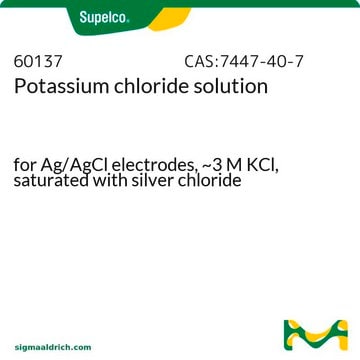348759
Silver
wire, diam. 1.5 mm, ≥99.99% trace metals basis
Sign Into View Organizational & Contract Pricing
All Photos(1)
About This Item
Linear Formula:
Ag
CAS Number:
Molecular Weight:
107.87
EC Number:
MDL number:
UNSPSC Code:
12141740
PubChem Substance ID:
NACRES:
NA.23
Recommended Products
Quality Level
Assay
≥99.99% trace metals basis
form
wire
resistivity
1.59 μΩ-cm, 20°C
diam.
1.5 mm
bp
2212 °C (lit.)
mp
960 °C (lit.)
density
10.49 g/cm3 (lit.)
SMILES string
[Ag]
InChI
1S/Ag
InChI key
BQCADISMDOOEFD-UHFFFAOYSA-N
Related Categories
Quantity
25 cm (approximately 5 g)
100 cm (approximately 20 g)
100 cm (approximately 20 g)
Signal Word
Warning
Hazard Statements
Precautionary Statements
Hazard Classifications
Aquatic Acute 1 - Aquatic Chronic 1
Storage Class Code
13 - Non Combustible Solids
WGK
WGK 3
Flash Point(F)
Not applicable
Flash Point(C)
Not applicable
Personal Protective Equipment
dust mask type N95 (US), Eyeshields, Gloves
Choose from one of the most recent versions:
Already Own This Product?
Find documentation for the products that you have recently purchased in the Document Library.
T Prameela Devi et al.
Indian journal of experimental biology, 51(7), 543-547 (2013-08-01)
A total of 75 isolates belonging to five different species of Trichoderma viz., T. asperellum, T. harzianum, T. longibrachiatum, T. pseudokoningii and T. virens were screened for the production of silver nanoparticles. Although all the isolates produced nanoparticles, T. virens
Abhijeet Mishra et al.
Journal of nanoscience and nanotechnology, 13(7), 5028-5033 (2013-08-02)
The primary challenge in developing nanoparticle based enzymatic devices is to be able to chemically immobilize an enzyme, which will retain its activity or improve its function while being attached to the nanoparticle. This would be of even greater significance
Agnieszka Rozbicka-Wieczorek et al.
Folia biologica, 61(1-2), 107-111 (2013-06-19)
Sheep milk is rich in CLA isomers which are biologically active components influencing human health. There are four geometric CLA isomer pairs: cis, trans; trans, cis; trans, trans and cis, cis. The aim of the present study was the analysis
Rui Wang et al.
Journal of nanoscience and nanotechnology, 13(6), 3851-3854 (2013-07-19)
The present studies reveal that silver nanoparticles (AgNPs) can induce apoptosis and enhance radio-sensitivity on cancer cells. In this paper, we mainly investigated the effect of AgNPs on rat glioma C6 cells upon the combination treatment of hyperthermia treatment (HTT).
R Nirmala et al.
Journal of nanoscience and nanotechnology, 13(7), 4686-4693 (2013-08-02)
We report on the preparation and characterization of polyurethane (PU) nanofibers containing silver (Ag) nanoparticles were synthesized by using electrospinning. Two different approaches were adopted to incorporate the Ag nanoparticles in to PU nanofibers. In the first approach, a homogeneous
Our team of scientists has experience in all areas of research including Life Science, Material Science, Chemical Synthesis, Chromatography, Analytical and many others.
Contact Technical Service





